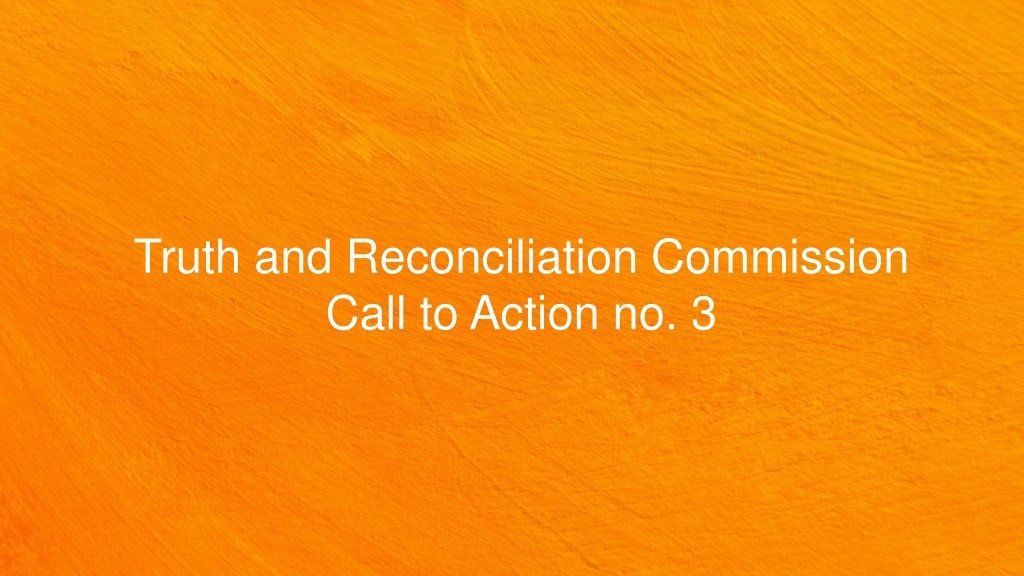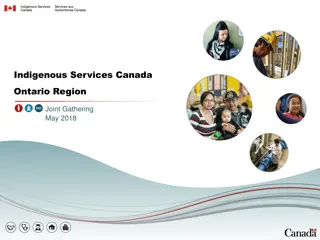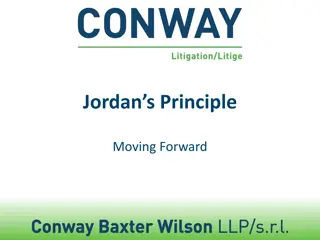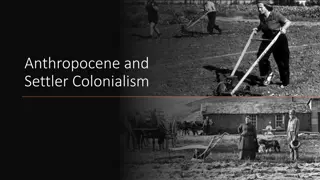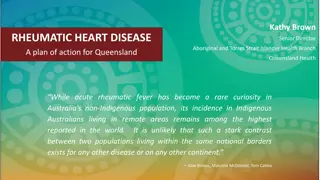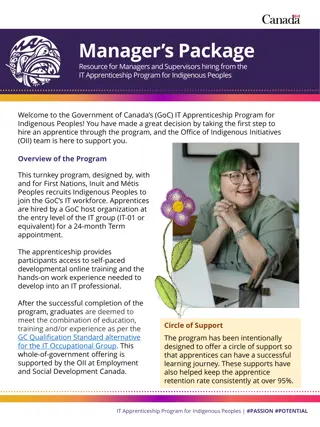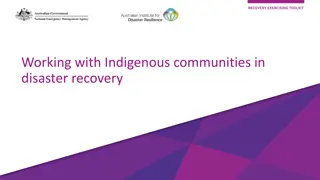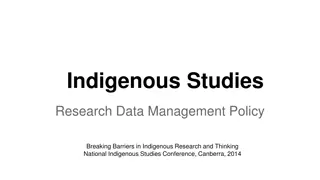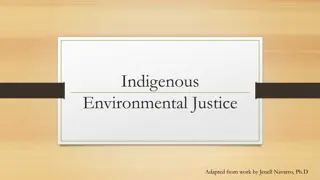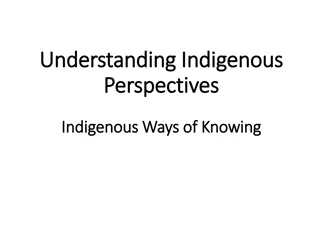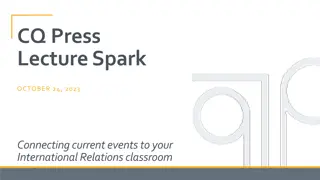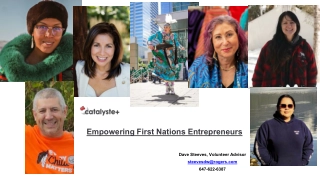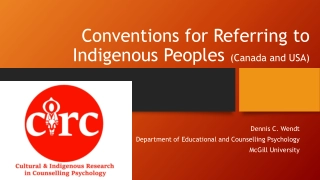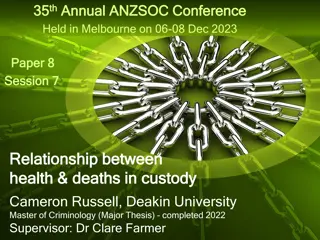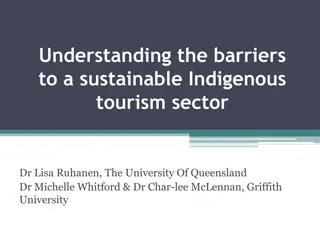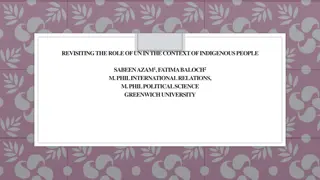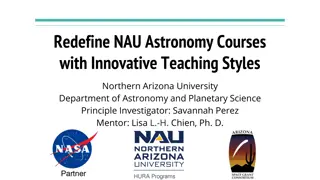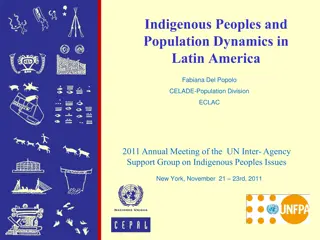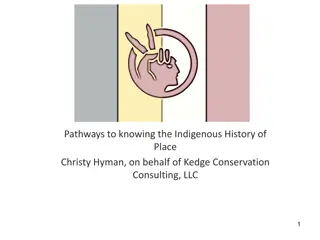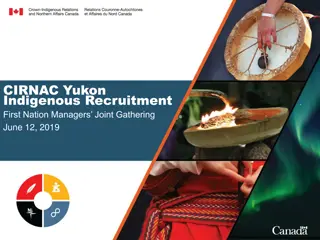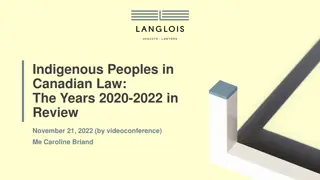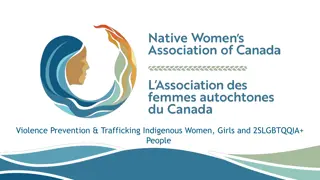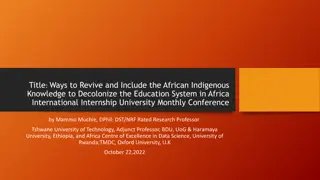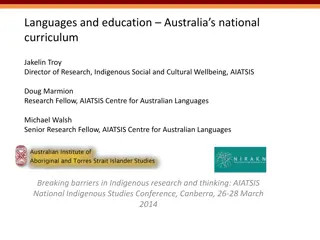Call to Implement Jordan's Principle for Indigenous Children
The Truth and Reconciliation Commission's Call to Action No. 3 emphasizes the need for all levels of government to fully implement Jordan's Principle, which prioritizes the needs and well-being of Indigenous children. Highlighting the story of Jordan River Anderson, the call underscores the importance of child-first decision-making across various sectors affecting Indigenous children's lives, from health care to education and family services. The prayer included acknowledges past harms and commits to working towards eliminating racism and injustice that continue to impact Indigenous children today.
Download Presentation

Please find below an Image/Link to download the presentation.
The content on the website is provided AS IS for your information and personal use only. It may not be sold, licensed, or shared on other websites without obtaining consent from the author. Download presentation by click this link. If you encounter any issues during the download, it is possible that the publisher has removed the file from their server.
E N D
Presentation Transcript
Truth and Reconciliation Commission Call to Action no. 3
Truth and Reconciliation Commission Call to Action no. 3 says: We call upon all levels of government to fully implement Jordan s Principle. Why justice is needed: Jordan s Principle places a child-first, needs-based lens on government and public agency decision-making and services for Indigenous children. Jordan River Anderson was from Norway House Cree Nation in Manitoba. He was born with complex medical needs and spent more than two years unnecessarily in hospital while provincial and federal governments argued over which jurisdiction was responsible for Jordan s health-care costs. Jordan died when he was five years old.
Truth and Reconciliation Commission Call to Action no. 3 says: We call upon all levels of government to fully implement Jordan s Principle. Why justice is needed: Calls to Action 1 5 deal with protecting and prioritizing the needs and well-being of Indigenous children. While Jordan s principle reflects a health-care setting, a child- first principle has implications across child poverty, housing, water, sanitation, food security, family violence, addictions, and educational inequities. Prioritizing the needs and well-being of children must also consider the shockingly disproportionate number of Indigenous children removed from their homes and even communities by Child and Family Service agencies. Fulfilling these Calls to Action, and upholding Jordan s principle, is critical for the well-being of Indigenous children in Canada.
Let us pray Creator God You cherish all your children and call us to love and care for them also. But we confess that our ways are too often not your ways; that our societies are unequal and our policies too often wounding. As a church, we have participated in the harms of colonization and racism with the result that generations of Indigenous children have been forced from families and communities. Their needs and well-being are not prioritized. In Christ, you were always on the move in a dangerous world and from the first night, you knew the terror of being away from your home and community. In silence, we remember and pray: for children who were taken from their homes to Residential Schools, and for their families for children who died because of Residential Schools for those who grieve the death of children.
for children and their families who are caught in cycles of violence. for children and their families who do not have access to the basic services necessary to be healthy, safe and thriving. for the Indigenous children who are, still today, being removed from their homes and communities by welfare services at disturbing and destructively high levels. for children who have felt there is no place for them in the world. Holy Spirit, stir in us dedication to the conviction that racism can be eliminated, and give us the will to work for the end of inequity and injustice that harms Indigenous children. Let us work for reconciliation. Amen.
Truth and Reconciliation Commission Call to Action no. 8
Truth and Reconciliation Commission Call to Action no. 8 says: We call upon the federal government to eliminate the discrepancy in federal education funding for First Nations children being educated on reserves and those First Nations children being educated off reserves. Why justice is needed: Call to Action no. 8 is one of several Calls to Action related to education for First Nations children, and it remains unmet. In the words of the 2021 Calls to Action Accountability report of the Yellowhead Institute, Calls to Action 6 12 address the colonial legacy of assimilative, violent, and chronically underfunded systems of education that Indigenous children and peoples experience in Canada. Meeting these calls is among the crucial steps to ensuring the well-being of Indigenous children and families, both now and for the future.
Let us pray Creator God of all knowledge, wisdom and love, you have called us to work for justice and equity wherever there is injustice. Christ taught that your reign is among us when children are loved, their needs met and when they are placed at the centre of our concern and care. As a church that ran Residential Schools, we participated in a system where Indigenous children were removed from their homes and communities. We know that we sinned and are complicit in creating the current system of injustice.
As a church, we repent of these sins and pray for hearts renewed to live out your justice. We know there is inequity and injustice in educational funding for Indigenous children and we cannot be complacent. We pray that those who form our laws will correct the injustice and inequity that Indigenous children experience, that their right to a good education is upheld, and that equitable funding will become a reality. Holy Spirit, nurture in us the humility, wisdom and will to pursue right action and to advocate for change. Let us work for reconciliation. Amen.
Truth and Reconciliation Commission Call to Action no. 48
Truth and Reconciliation Commission Call to Action no. 48 says: We call upon faith groups to formally adopt and comply with the principles, norms, and standards of the United Nations Declaration on the Rights of Indigenous Peoples (UNDRIP) as a framework for reconciliation. Why are Indigenous rights important? We are called to ensure our actions and behaviours uphold the United Nations Declaration on the Rights of Indigenous Peoples (UNDRIP). The principles address: protection from discrimination and violence, the right to health, safety and well-being, and a recognition of the inherent worth of Indigenous identity, spirituality, knowledge, laws and governance. These principles are a minimum standard for the well-being of Indigenous peoples. In Canada, the legacy of anti-Indigenous racism has meant that Indigenous peoples are more likely to experience violence, higher mortality rates and poorer health outcomes across a wide spectrum of health-related issues (including emotional, physical, spiritual, and mental health), as well as barriers to housing, education, employment, treatment, food, and economic security. While the church has apologized and confessed its role in running Residential Schools and rejected the Doctrine of Discovery, we also acknowledge that systemic racism shapes our society, which includes the church. It will only be eliminated with ongoing intentional action. The UNDRIP is a critical framework to guide our actions as we seek to eliminate anti-Indigenous racism.
Let us pray Creator God you have called us to justice and to right relationship with you, with each other and with creation. But we confess our policies and practices do not reflect your will and the politics Christ taught. As a church, we participated in policies and were shaped by doctrines and dogmas that distorted and misrepresented the Good News of the Gospel and that were unjust and harmful. We repent of these ways, and we seek anew to live as we ought. Guide us that we might uphold justice and reconciliation in the practices that shape our lives, and the policies that govern us. Strengthen the conviction that human and Indigenous rights point toward the inherent dignity of all people. Let us work for reconciliation. Amen.
National Inquiry into Missing and Murdered Indigenous Women and Girls Call for Justice 15.2
National Inquiry into Missing and Murdered Indigenous Women and Girls Call for Justice 15.2: This is a Call to all Canadians to decolonize by learning the true history of Canada and Indigenous history in your local area. Learn about and celebrate Indigenous peoples history, cultures, pride, and diversity, acknowledging the land you live on and its importance to local Indigenous communities, both historically and today. Why work to decolonize? Colonialism reflects a history where Christian European nations, holding a belief of their cultural superiority, dominated and dispossessed Indigenous peoples of their traditional lands and territories. For centuries, Indigenous people were treated as less than human. This violent legacy included: mass death due to epidemics (i.e., smallpox, measles, and influenza) subjugation and forced removal of Indigenous communities from homes and livelihoods development of the reserves and pass system (meant to control Indigenous peoples movement) denial of food and the right to access food sources stripping away of cultural expressions, language, intergenerational knowledge, spiritual practices, and forced participation in institutions like residential, industrial and day schools the Indian Act the Road Allowance People (M tis people, dispossessed of their lands and with few other options, resided on Crown land set aside for road development in rural places across the Prairies)
National Inquiry into Missing and Murdered Indigenous Women and Girls Call for Justice 15.2: This is a Call to all Canadians to decolonize by learning the true history of Canada and Indigenous history in your local area. Learn about and celebrate Indigenous peoples history, cultures, pride, and diversity, acknowledging the land you live on and its importance to local Indigenous communities, both historically and today. Indigenous women and girls are, collectively, more likely to face or experience violence than any other group in Canada. Anti-Indigenous racism manifests in the systemic callousness that Indigenous people, especially women and girls, face in encounters with health systems, police, family and child services, and other public agencies. This legacy of violence is not the result of the personal circumstances of any single person, but rather the impact of a system that has devalued Indigenous identity and treated Indigenous people as less than non-Indigenous people by settler peoples and governments. This must change. This Call to Justice from the National Inquiry into Missing and Murdered Indigenous Women and Girls is a call to all Canadians to understand and to work to dismantle the racist systems that have resulted in violence and death.
Let us pray Creator God we live and love imperfectly. You called us to love our neighbour as ourselves but collectively we have not, and individually we fall short. We say all people reflect your image but our actions betray what we say. For those of us living with pain or grief caused by racism and colonialism, we ask you for healing and strength. For those of us living with privilege and wondering what to do, we ask for the strength to learn, to listen and to work to end systems that oppress. As you came to set captives free, free us all from those ways of thinking, speaking and acting that belittle or harm any of your beloved creations and show us again how to live in your love. Let us work for reconciliation. Amen.
